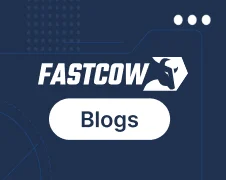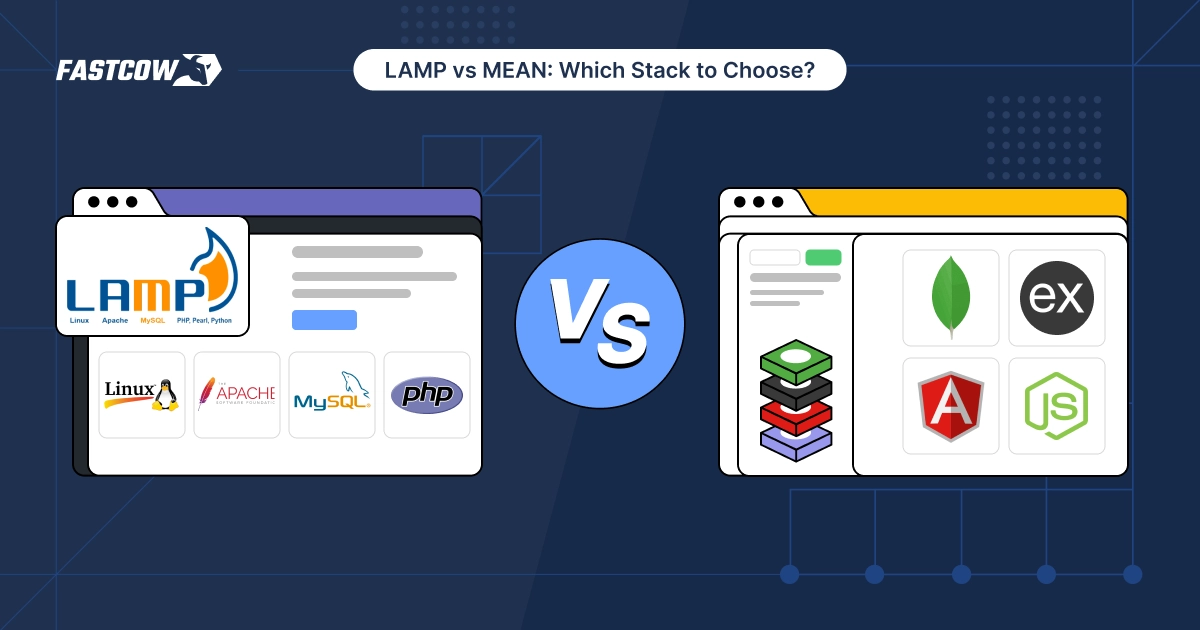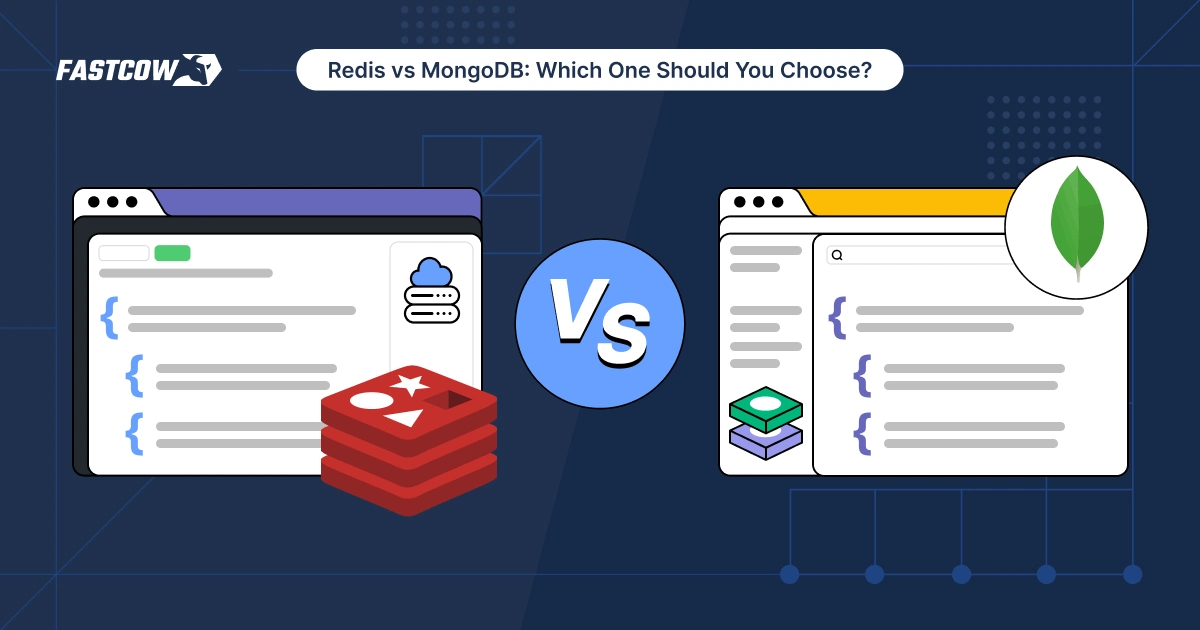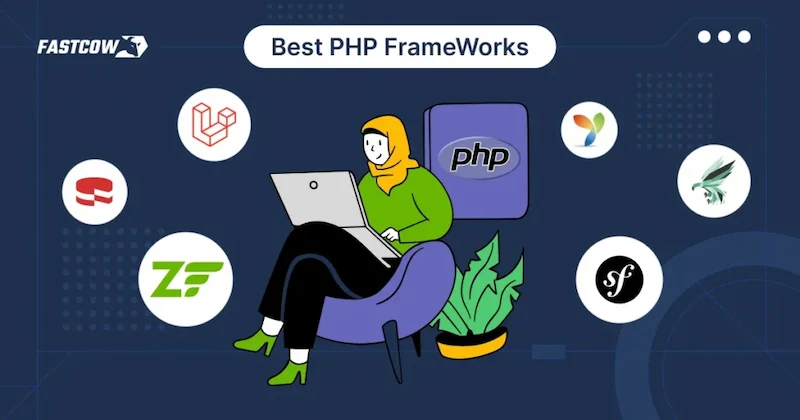
Are you a developer wondering what the best PHP framework for your next project should be? Or a beginner wondering where to get started?
Despite claims about its fading popularity, PHP remains essentially the engine behind much of the web, with as many as 80% of modern websites currently built on it. If you’re looking to start a new project, PHP is still one of the best tools, and you’ll have PHP frameworks to choose from.
Most PHP frameworks are great tools that you can use to build anything from one-page websites to enterprise applications and content management systems. However, they all have some differences and work in slightly different ways.
This article is a great place to start if you're trying to decide. We’ll discuss the pros and cons of each PHP framework and leave you with some recommendations.
Let’s dive into it!
What are PHP Frameworks?
PHP Frameworks are collections of reusable bits of PHP code systematically put together in a single software platform to help enhance web development.
With advancements in coding, the days of writing every line of code from scratch are long gone. Instead, modern developers generally rely on these frameworks to get their projects up and running in much shorter periods than before and with more reliable results.
Should You Use a PHP Framework?
There are usually different ways to approach any web development project. For complex, unique projects, you could choose to write all the code yourself. You could also use a CMS like WordPress instead for smaller ones.
In either case, a PHP framework would do a great job and might be the better tool. We’d generally advise using PHP frameworks most of the time, and here’s why:
1. Faster Development
PHP frameworks can significantly accelerate development speeds by providing pre-built components and tools. These tools help eliminate hours of manual coding and speed up the testing, debugging, and deployment processes.
2. Enforcement of Good Coding Practices
Another good reason to consider using PHP frameworks is that they generally apply coding best practices, leading to neater, more scalable, and more easily maintained code.
3. Ensure Better Security
Frameworks incorporate advanced security measures to mitigate common vulnerabilities like SQL injections and cross-site scripting. You’ll still need to stay vigilant and implement additional cybersecurity best practices.
4. Enhanced Teamwork
Development teams may find that the uniformity of standards used by PHP frameworks can help to enhance collaboration. Even when team members may have varying skill levels, using a framework helps keep everyone on the same page.
5. Easier to Maintain
Most PHP frameworks receive regular updates that typically address core maintenance issues. This allows developers to focus on other things that are harder to automate.
As we’ve shown, using PHP frameworks is generally a good idea. However, while these frameworks typically use the same principles, they still work differently. In the next section, we’ll explore some factors to consider when choosing the best PHP framework for your project.
How to Choose the Best PHP Framework
Most of the PHP Frameworks we’ll discuss are great tools that work well. Using any of these tools should be fine for most development needs. The question we’ll focus on, instead, is which may be best for your unique needs. In considering this, here are some of the critical factors to keep in mind:
Project Requirements
Some frameworks are more powerful than others, but the scope of a project may not always call for the most powerful PHP framework. Since these frameworks may come at some cost financially and in terms of a learning curve, you should choose the one most suited for the project you’re building and your current skill level.
Technical Specifications
Choosing a PHP framework that integrates well with your server and database is essential. A good match between these elements will help support the performance of your application, while any mismatches could lead to instabilities. Some PHP frameworks support more databases than others, and that might be something to watch out for when deciding which one is best for you.
Learning Curve
Some frameworks have a steeper learning curve, and if there is too much of a mismatch between your skills and the technical depth of a framework, this might get in the way of your project.
Security
Most PHP frameworks provide some security features to some degree. Some provide stronger built-in defenses, while others may leave it up to developers to take care of this themselves.
Common cybersecurity threats like SQL injection attacks, cross-site request forgery (CSRF), cookie attacks, and so on won’t be completely preventable just by choosing any one PHP framework. Still, the right one will offer good defenses that you can build on. Again, your current skill level is an important factor to keep in mind here.
Performance and Scalability
PHP generally scales well; however, as we’ve mentioned, some frameworks are better suited to heavier projects and, thus, scale better. Again, you should choose a framework that most closely meets your needs.
Debugging and Caching
Every PHP framework comes with some debugging capability. In some cases, however, this will need to be implemented via an extension, which may not be as seamless as using an inbuilt debugging feature. Similarly, caching is an essential feature of PHP frameworks, and choosing one that delivers on this well would be a good idea.
Support
Support is a significant factor, particularly if you’re a beginner or intermediate developer. Most open-source frameworks tend to rely on user communities to provide voluntary support, and while this can be helpful, it might mean that there’ll sometimes be no one to attend to your challenges in any depth.
For frameworks with larger communities, this might be less of an issue, but if you choose a framework with a smaller community, it might be something to think about before you commit.
Costs
Most popular PHP frameworks are free to use but the associated costs of thing like web hosting can be significant. The more powerful the framework, the more you’ll be likely to spend in acquiring the supporting infrastructure.
We’ve previously made the case for choosing the PHP framework that meets your needs. We’ll also argue that you should consider the costs, too, as a lower budget might make investing in a higher-powered framework hard to justify.
Remember, these frameworks are all pretty good, and the final decision should come down to choosing the most suitable one for your needs.
The Most Popular PHP Framework for 2024
Now that you know what to look for in a PHP framework, let’s answer the following question: What are some popular PHP frameworks that meet these requirements? This is far from an exhaustive list, but we’ll cover all the best and most popular PHP frameworks to consider.
Here’s a table that highlights the key differences:
| Framework | Key Features | Pros | Cons |
|---|---|---|---|
| Laravel | Blade templating engine; Eloquent ORM; Artisan CLI |
- Clean syntax - Large community - Scalable - Strong security |
- Slower compared to minimalistic frameworks - Steep learning curve - Requires significant hosting resources |
| Symfony | Modular component system, Twig templating, commercial support |
- Flexible architecture - Highly scalable - Large community |
- Steep learning curve - Weaker performance - Complex setup |
| CodeIgniter | Lightweight, flexible MVC architecture |
- Small footprint - Easy to learn - Good performance |
- Limited features - Less scalability - Less extensive documentation |
| Laminas | Component-based architecture, enterprise-grade support |
- Stable and reliable - Large community |
- Steep learning curve - Complex initial setup |
| Yii | Gii code generator; RESTful API support; Clear directory structure |
- Strong security - Highly scalable - Strong performance |
- Steep learning curve - No support for template inheritance |
| CakePHP | Convention-over-configuration approach; Strong built-in security features |
- Easy to configure - Well-organized code - Robust security |
- Smaller community - Not suited for enterprise-level projects - Gentle learning curve |
| Phalcon | C extension for high performance, Volt templating engine, modular components |
- High speed - Low memory footprint - Comprehensive features |
- Steep learning curve - Complex installation - Smaller community |
| Slim | Lightweight micro-framework, ideal for APIs and microservices |
- Fast and lightweight - Easy to learn - Good for small apps |
- Limited features - Less suitable for large projects |
| FuelPHP | Supports MVC and HMVC modular development |
- Supports both MVC and HMVC - Good performance - Active community |
- Learning HMVC can be challenging - Less adoption |
| The Fat-Free Framework | Minimalist, plugin and extension system, lightweight templating engine |
- Lightweight - Minimal configuration - Flexible |
- Smaller community - Steeper learning curve |
Let’s go over the list in detail:
- Laravel
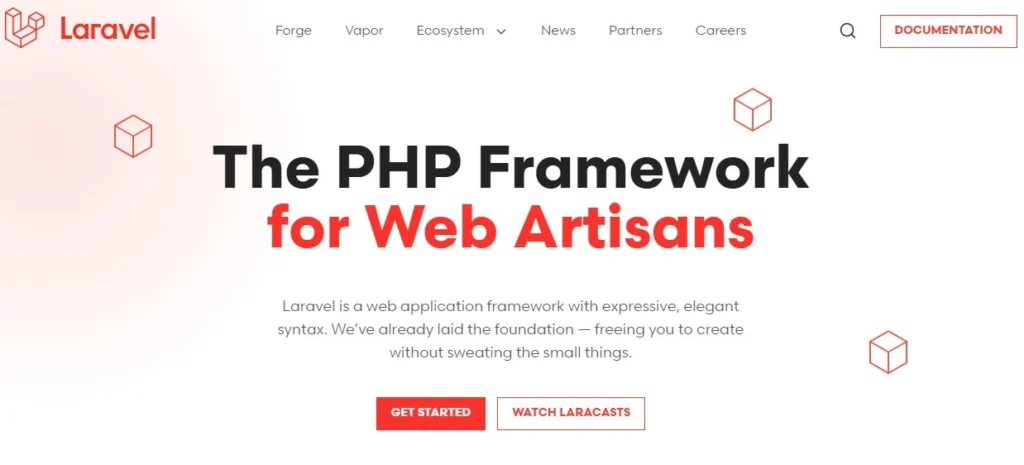
Laravel is one of the most popular PHP frameworks available today. Although it’s not the easiest framework to use, it’s quite powerful and offers numerous helpful features.
To begin with, when you use Laravel, you’ll be able to take advantage of its powerful templating engine called Blade, and the neat, easy-to-read syntax it creates.
To help you get started, the framework also comes with starter kits that provide front and back-end authentication scaffolding for your project.
Given its immense popularity, Laravel has a huge active user community, so you can almost always count on available support and helpful resources.
To get started, you’ll need PHP 8.0 or higher. Laravel works best with relational databases like MySQL, PostgreSQL, SQLite, and SQL Server.
Pros:
- Clean, easy-to-read syntax
- A large, active community providing support and third-party resources
- A wide range of built-in features, tools, and conventions that help speed up development
- Extremely scalable, with the ability to handle small to large-scale applications
- Solid security features that protect against common vulnerabilities
Cons:
- Somewhat slow in comparison to minimalistic frameworks
- Not the easiest learning curve
- Requires significant hosting resources as it comes with a large footprint
- Symfony
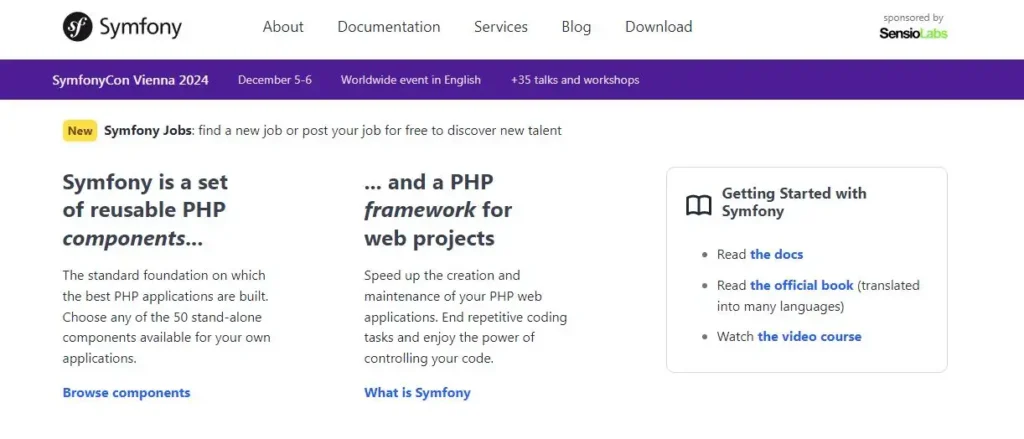
Symfony is a good PHP framework for building large enterprise applications. If you’re looking for a modular, flexible framework, this could be a great choice.
Symfony's templating engine, Twig, enables the creation of dynamic templates with simple, readable syntax. However, despite its power and flexibility, Symfony may not be the best tool for everyone, as it has a steep learning curve.
If you’re a more experienced developer, this might not be a major concern, as you’ll have a large user community and a database of extensive documentation to count on.
Additionally, Symfony is commercially supported by its creator, Sensio Labs, which means you’ll have access to dedicated professional assistance if needed.
To get started with Symfony, you’ll need PHP 8.2 or higher. You’ll also need to have Composer installed. Symfony supports Drizzle, MySQL, Oracle, PostgreSQL, SAP Sybase SQL Anywhere, SQLite, and SQLServer.
Pros:
- Component-based architecture that allows for flexibility
- Highly scalable
- A large and active community of users providing support and third-party resources
Cons:
- Steep learning curve
- Weaker performance when compared to other frameworks
- The initial setup can be complex
- CodeIgniter
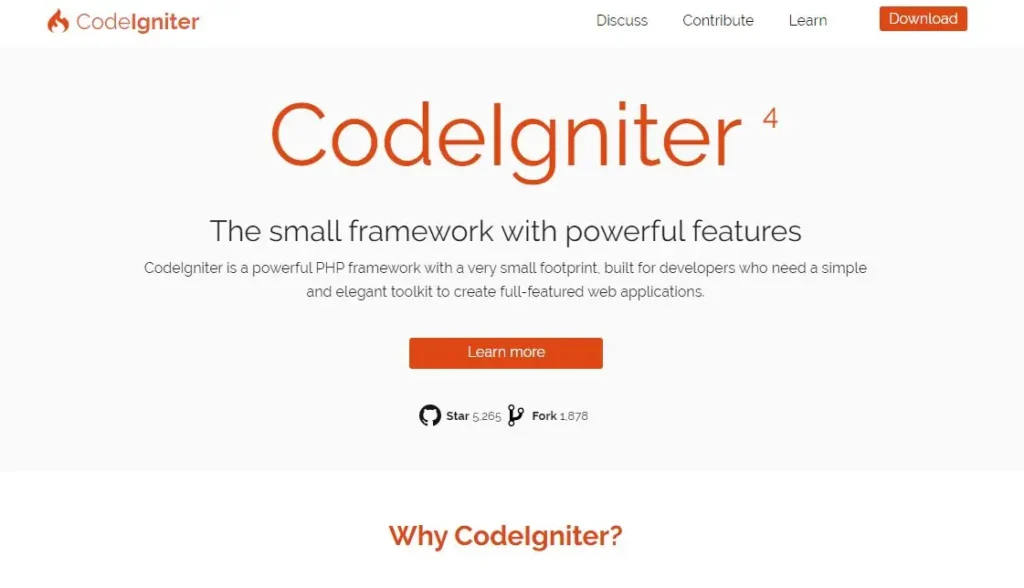
CodeIgniter is a lightweight framework with flexible MVC architecture. It's also easy to learn and offers good performance and security features.
If your project requires a lightweight framework, CodeIgniter is one of the best ones, but if you’re hoping to scale eventually, you may be better off looking elsewhere.
In addition to being lightweight, one of the main attractions of CodeIgniter is that it has a gentle learning curve, making it suitable for beginners.
To get started with CodeIgniter 4, you’ll need PHP 8.1 or higher. CodeIgniter supports MySQL, PostgreSQL, SQLite3, Microsoft SQL Server, and Oracle Database.
Pros:
- Small footprint and good performance.
- Easy to learn
- A large and active community of users providing support and third-party resources
Cons:
- Comparatively limited features
- Not the most scalable PHP framework
- Less extensive documentation
- Laminas (formerly Zend)
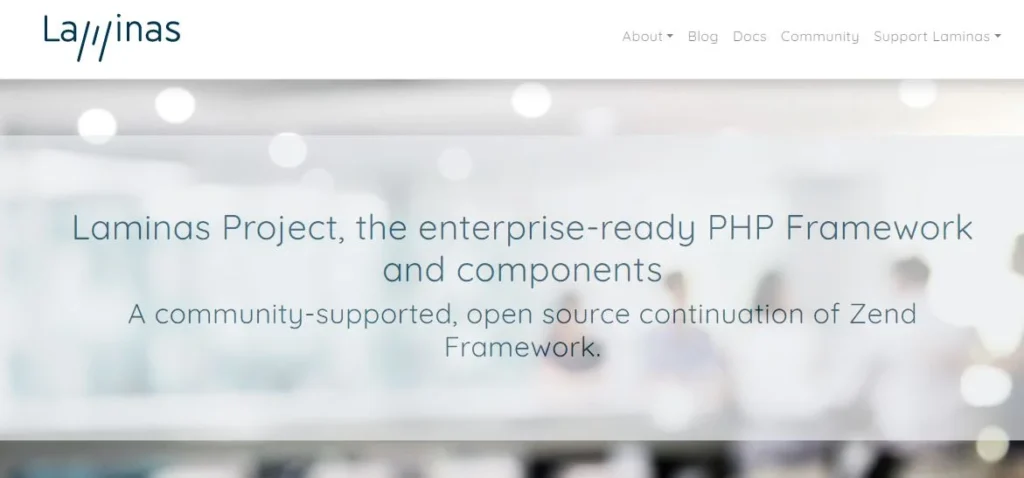
Laminas is a popular PHP framework for building enterprise-grade web services and apps. It uses component-based architecture, which makes it flexible and reliable.
Laminsas is the current version of what used to be Zend, a widespread and longstanding PHP framework itself. Technically, the old version of Zend still exists and can be used with older versions of PHP. To use Laminas, however, you’ll need PHP 8.1 or later.
Laminas supports MariaDB, MySQL, Oracle, IBM DB2, Microsoft SQL Server, PostgreSQL, SQLite, and Informix Dynamic Server.
Pros:
- Highly stable and reliable
- Component-based architecture
- A large and active community of users providing support and third-party resources
Cons:
- Steep learning curve
- The initial setup can be complex
- Yii 2
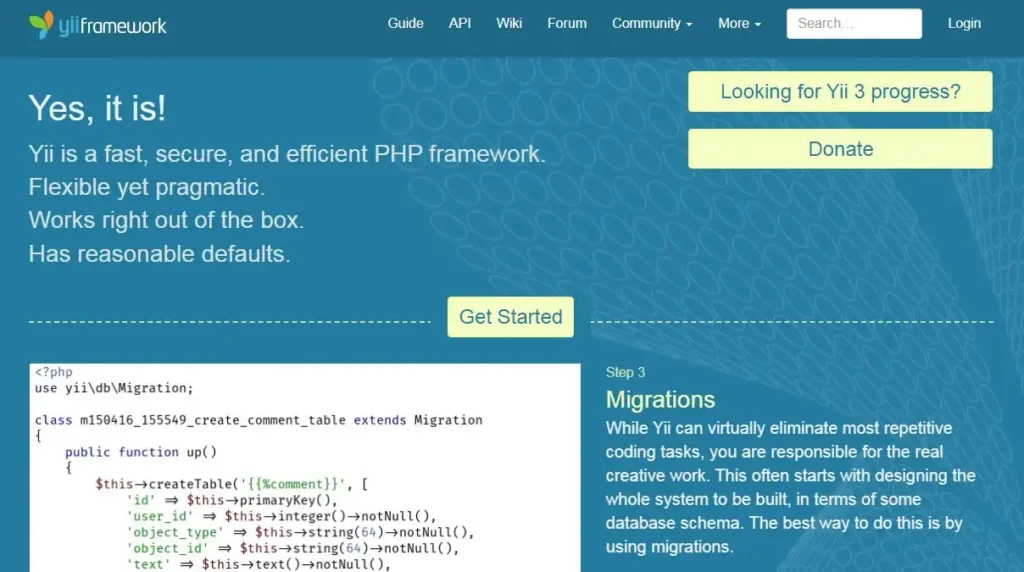
Yii 2 is a high-performance PHP framework that handles small and large-scale applications. Its built-in code generator, Gii, is quite powerful and helps speed up development. Yii 2 also offers built-in support for building RESTful APIs.
Along with its clear directory structure, it may help create a smoother learning curve and a more seamless development experience compared to some other frameworks.
To get started with Yii 2, you’ll need to have PHP 5.4.0 installed along with Composer. Yii supports SQLite, MySQL, PostgreSQL, MSSQL, and Oracle.
Pros:
- Strong security features
- Highly scalable
- Strong performance
- A strong community provides support and resources.
Cons:
- Steep learning curve
- No support for template inheritance
- CakePHP
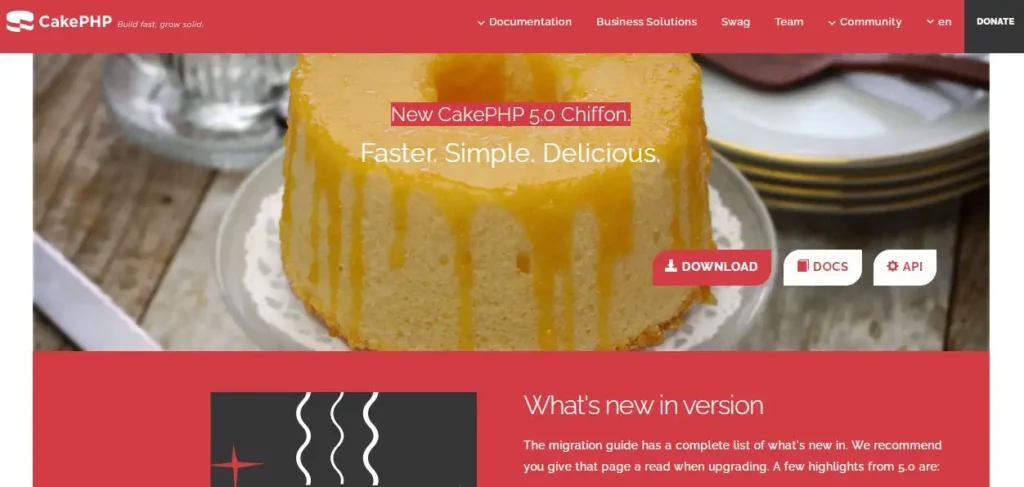
CakePHP is one of the most popular PHP frameworks and is usually considered a good alternative to other popular frameworks like Laravel. This framework is particularly known for being easy to install and configure, especially if you’re new to PHP frameworks.
One of the main reasons why CakePHP is so popular is that it follows a convention-over-configuration approach, which eliminates the need for lengthy and complex configuration processes.
You’ll need PHP 8.1 or later to get started with CakePHP. The framework supports MySQL 5.1+, Postgres 8+, SQLite3, SQLServer 2008+, and Oracle.
Pros:
- Relatively easy to configure
- Promotes well-organized and maintainable code.
- Robust data validation and application security features
Cons:
- Smaller developer community and less support available
- Not suitable for enterprise-level development projects
- Gentle learning curve
- Phalcon
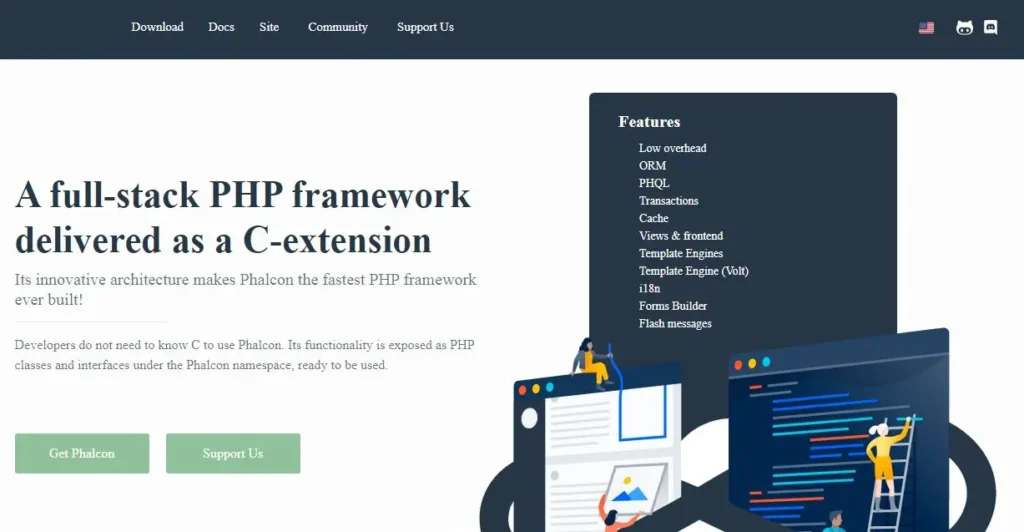
Phalcon is a high-performance PHP framework popular for its tiny footprint and for usually offering exceptional performance.
Unlike the other frameworks we’ve talked about, Phalcon is written in Zephir and compiles to C. However, you do not need to be fluent in either Zephir or C to work with Phalcon.
In addition to its strong performance, Phalcon has many handy features and tools. These include the Phalcon ORM and its templating engine, Volt.
Some other features you might find particularly useful include Phalcon's utilization of modular components, which allows you to create your own directory structure. Also, since the core Phalcon code is integrated as an extension, isn’t stored in the directory, which contributes to its strong performance.
You’ll need PHP 8.0 and above to get started with Phalcon. The framework supports MySQL, PostgreSQL, SQLite, Microsoft SQL Server, Oracle, and MongoDB.
Pros:
- High speed due to its C extension architecture.
- Low memory footprint
- Offers a comprehensive range of features
Cons:
- Steep learning curve
- Installation can be more complex compared to PHP-based frameworks
- Smaller developer community
- Troubleshooting issues can be more challenging for beginners
- Slim
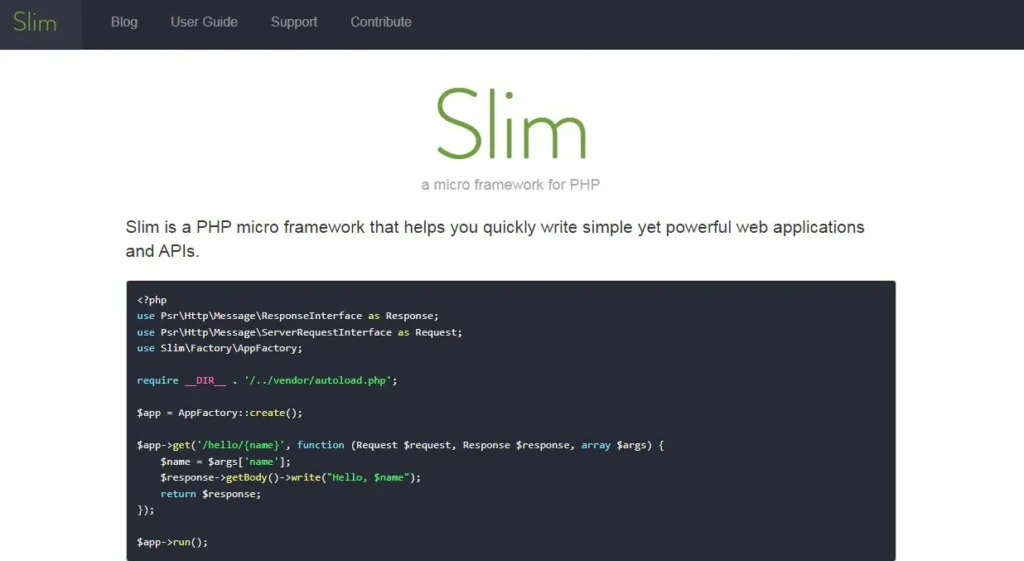
Slim is a PHP micro-framework that can be used for building APIs and less complex applications. The framework’s main appeal is its lightweight, minimalistic setup, which makes for good performance.
If you would like to try using Slim for more complex projects, you may need to integrate it with other tools, such as ORM, routing, and validation libraries.
While Slim has fewer features to offer, it excels at routing using callback functions. This makes it a great tool for building RESTful APIs, creating microservices, and rapid prototyping.
Slim 4 requires PHP 7.4 or later. The framework is database agnostic and will support most common databases, but Eloquent is recommended.
Pros:
- Lightweight and fast
- Ideal for building small applications and APIs.
- Easy to learn
Cons:
- Limited features
- The lack of inbuilt features may make this a less suitable framework for inexperienced developers.
- Might struggle with large-scale projects
- FuelPHP
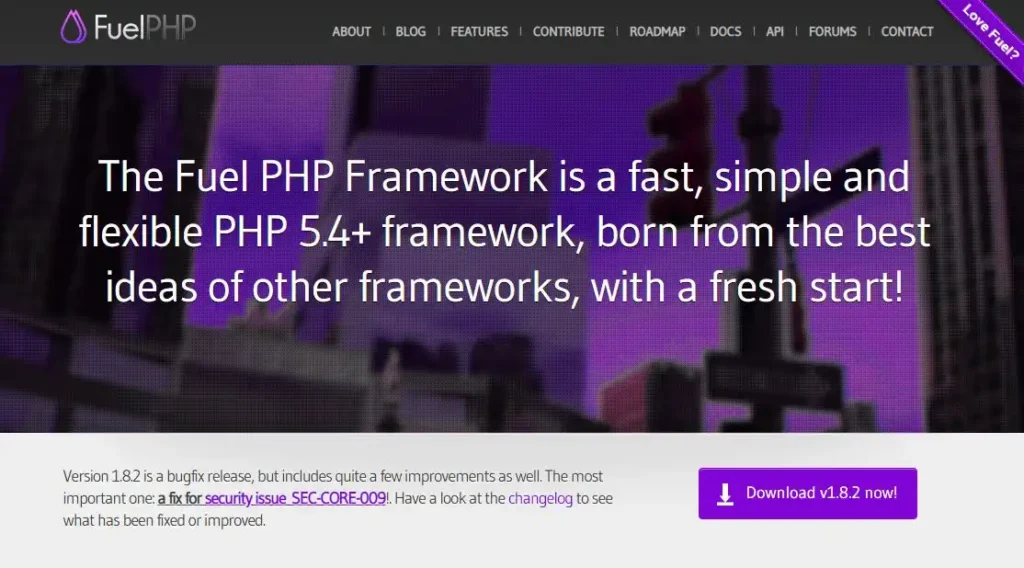
FuelPHP is a versatile and lightweight PHP framework. It excels at implementing separation of concerns and offers support for both MVC and HMVC architectural design patterns.
One way that FuelPHP stands out compared to some other PHP frameworks is its support for modular development approaches. Each module is allowed its subdirectories for controllers, models, views, and configuration files. The framework also supports nested modularity.
Thanks to these, FuelPHP is an excellent choice for projects where performance is of the essence. FuelPHP does not have an inbuilt templating engine. However, it integrates well with third-party engines like Twig, Mustache, and others.
FuelPHP supports MySQL, PostgreSQL, SQLite, and Oracle
Pros:
- Supports both MVC and HMVC architectural patterns, offering adaptability
- Generally performs well considering its feature set
- An active community providing support and third-party resources
Cons:
- Understanding HMVC might require additional effort compared to traditional MVC.
- It's less widely adopted than other frameworks, which might affect talent availability
- The Fat-Free Framework
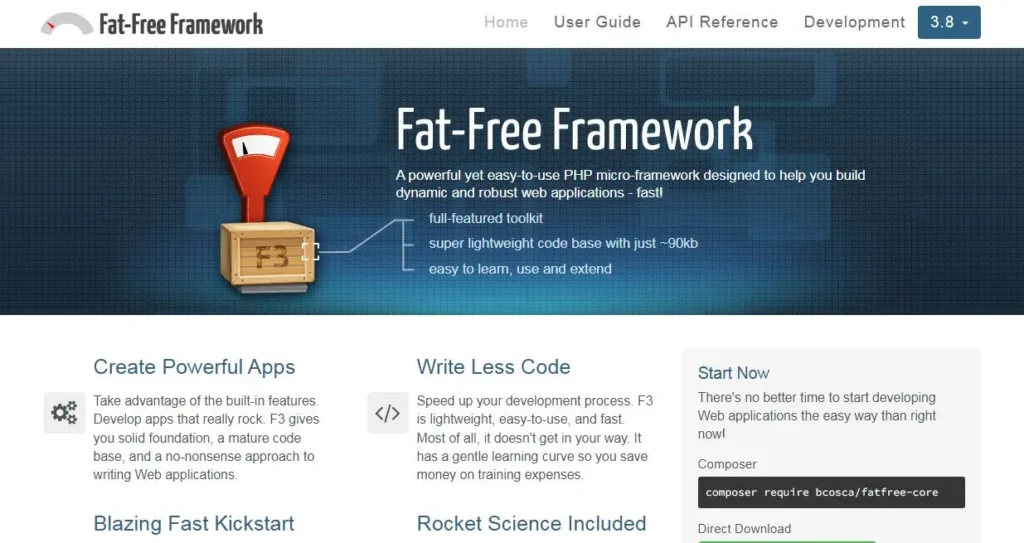
The Fat-Free Framework is a minimalist PHP framework, which means it’s usually great for lightweight projects where speed and efficiency are priorities.
F3 has a plugin and extension system with a good range of features, allowing developers to extend its functionality to meet various project needs.
The Fat-Free Framework has an inbuilt templating engine called the F3 Template. However, this tool is lightweight and less powerful than other frameworks, such as Laravel. For security, the Fat-Free Framework offers built-in defenses against CSRF and some basic XSS filtering.
To get started with version 3.7 or higher of the Fat-Free Framework, you’ll need PHP 5.4 or higher. The Fat-Free Framework supports MySQL, PostgreSQL, SQLite, MSSQL (Microsoft SQL Server), and MongoDB.
Pros:
- Lightweight and fast
- Minimal complexity in configuration
- Highly flexible
Cons:
- Smaller developer community
- Steeper learning curve
Important Things to Know About PHP Frameworks
PHP frameworks are powerful tools that can create complex, dynamic applications. However, they don’t completely take away the need for some level of human input into the development process. To get the best results, you still need to know your way around code and some fundamental programming concepts. Here are some of the most important prerequisites to have before you try your hands at a PHP framework:
A Strong PHP foundation
As we’ve shared, PHP frameworks reduce the amount of coding developers may need to do, but they won’t eliminate the need to write code entirely. You’ll still need to have a good understanding of PHP syntax and other programming concepts like object-oriented programming and database interactions.
An Understanding of Object-Relational Mapping (ORM):
Object-relational mapping is a crucial pillar of how most PHP frameworks work. There are different ORM tools like Eloquent or Doctrine, and understanding what they are and how they work will help you decide which frameworks to use for your projects.
An Ability to Set Up and Manage Servers
Knowing how to set up and manage web servers such as Apache and Nginx would be helpful too. Installing a PHP framework requires some technical know-how, and if you get this wrong, you may run the risk of having your entire project derailed or interrupted down the line.
An Understanding of Separation of Concerns:
The separation of concerns is an important concept in modern web development. The idea is to separate the underlying components and processes in a web development to enhance their efficiency.
In web development, the most important separation of concerns concepts are Model-View-Controller (MVC) and Hierarchical MVC architectural design patterns. Understanding how and why data, presentation, and user interactions are separated in these patterns will help you make the most of any PHP framework you choose.
MVC tends to be enforced by default by most PHP frameworks, but this is not always the case. However, even with PHP frameworks that don’t strictly enforce MVC, developers can still implement it manually if they understand the basic principles.
What is the Best PHP Framework for Beginners?
We’ve covered quite a few different PHP frameworks. If you’re a beginner, you may be looking for one with a lower barrier to entry and a gentle learning curve. These would be our top recommendations:
Laravel
Laravel isn’t the easiest tool to master, as it has an extensive feature base. However, it also offers excellent documentation to guide you along every step, and you’ll have a huge community of active developers to fall back on if you need some help.
CodeIgniter
CodeIgniter arguably offers the easiest entry path for beginners to the world of PHP frameworks. For a gentle learning curve, CodeIgniter is the framework we’d recommend.
Getting Started With a PHP Framework
As we’ve shared, PHP frameworks are powerful tools that can simplify the development process, enhance security, and improve collaboration. There’s no one-size-fits-all answer so be sure to choose the framework that works best for you. If you follow the advice we’ve shared in this article, you’ll be off to a great start!













